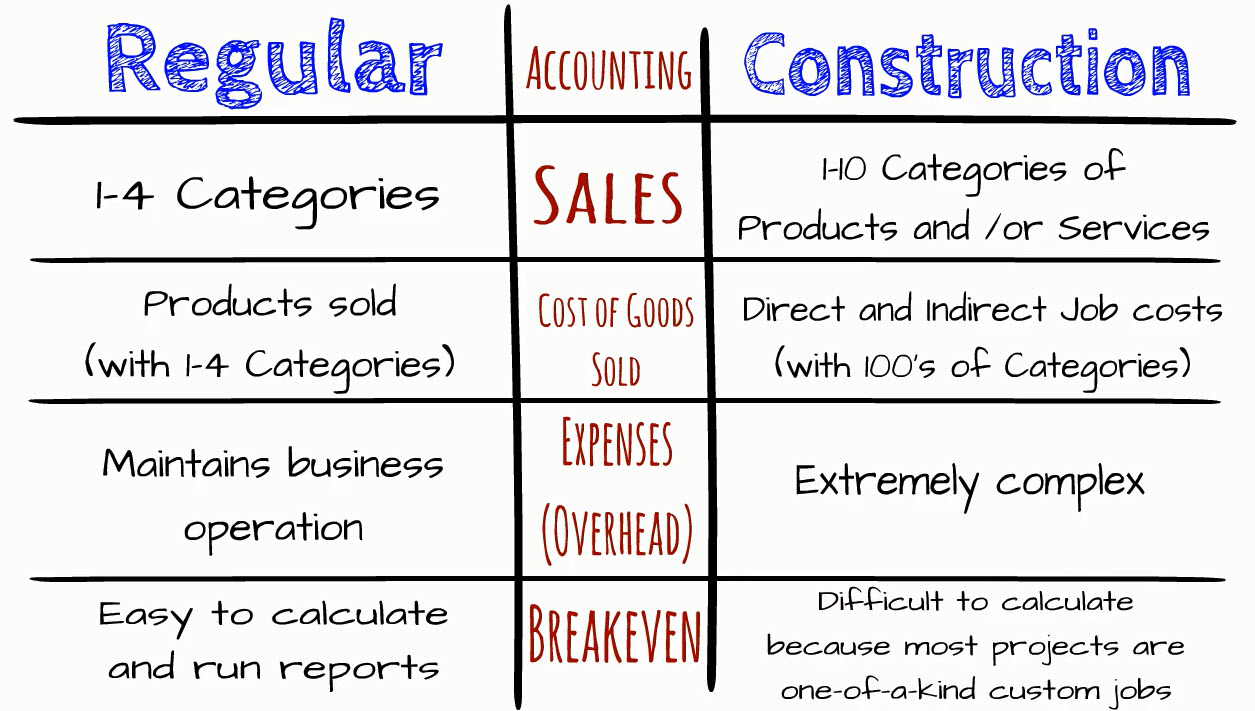Construction Accounting: How to Keep Your Projects Profitable and Financially Stable
Construction Accounting: How to Keep Your Projects Profitable and Financially Stable
Blog Article
Comprehending the Relevance of Construction Audit for Effective Job Monitoring

Function of Construction Audit
Construction accounting works as the foundation of monetary monitoring in the building industry, ensuring that projects are completed within spending plan and economic goals are met. construction accounting. This specialized bookkeeping strategy addresses the one-of-a-kind difficulties encountered in building tasks, consisting of differing job periods, varying expenses, and numerous stakeholders
Among the main roles of building bookkeeping is to supply precise expense estimation and monitoring throughout the job lifecycle. This helps with enlightened decision-making, enabling task managers to change resources and timelines efficiently. In addition, construction accounting improves capital administration by checking accounts receivable and payable, therefore guaranteeing that funds are readily available for timely settlements to providers and subcontractors.
It gears up project managers with the needed monetary data to prepare in-depth monetary statements, which are necessary for audits and monetary testimonials. Ultimately, the function of construction accountancy expands beyond simple monetary monitoring; it is indispensable to strategic planning and operational effectiveness, driving the success of building jobs in an affordable landscape.
Trick Elements of Building And Construction Accounting

Budgeting develops a financial framework that overviews task execution, allowing managers to designate sources efficiently and anticipate prospective monetary obstacles. Accurate cost tracking is vital for surveillance expenses in real-time, helping to determine variations in between predicted and real prices. This makes it possible for timely adjustments to keep the project on budget.
Furthermore, monetary reporting offers stakeholders with a clear photo of the job's monetary health and wellness. Routine reports, such as profit and loss statements and cash flow evaluations, facilitate educated decision-making and boost openness among all parties involved.
In addition, conformity with market guidelines and audit standards is important. This guarantees that monetary practices are not only effective yet additionally legal, protecting the organization versus lawful repercussions. By integrating these vital elements, building accounting cultivates an organized method to managing funds, inevitably adding to the successful conclusion of building tasks.
Advantages for Project Supervisors
Leveraging efficient building and construction bookkeeping methods gives project managers with a wide variety of advantages that enhance both operational effectiveness and monetary oversight. One considerable benefit is boosted budget management. Precise tracking of earnings and expenses allows project managers to keep track of monetary performance in genuine time, making sure jobs stay within budget and assisting in prompt modifications when essential.
Furthermore, construction accounting streamlines capital monitoring, making it possible for task supervisors to optimize and prepare for economic requirements resource allocation. By recognizing cash money inflows and discharges, they can better manage settlements to employees, subcontractors, and distributors, thereby staying clear of expensive hold-ups.
Furthermore, robust accountancy systems offer comprehensive coverage capabilities. Task managers can create reports that supply insights right into project productivity, expense differences, and resource application. This data-driven technique fosters notified decision-making, permitting managers to identify potential problems proactively and carry out rehabilitative steps.
Last but not least, adherence to building accounting requirements makes certain compliance with regulative and lawful requirements, reducing the threat of conflicts or fines. Overall, efficient building and construction accounting furnishes task supervisors with the tools required to drive job success, boost stakeholder self-confidence, and promote long-term organizational growth.
Typical Obstacles in Building And Construction Accounting
Numerous job supervisors experience considerable difficulties in building accountancy that can prevent task success. Among the key obstacles is the intricacy of tracking numerous work websites, see page each with distinctive spending plans, timelines, and source appropriations. This calls for thorough focus to information, which can be frustrating without a durable accountancy system in position.
In addition, rising and fall product prices and labor prices can make complex budget plan administration, making accurate forecasting hard. Task supervisors commonly have a hard time to fix up these costs with real expenses, resulting in potential financial disparities.
In addition, building and construction accountancy involves conformity with different policies, consisting of tax obligation obligations and labor regulations. Browsing these guidelines can be challenging, particularly for supervisors who might not have a strong audit history.
Another substantial challenge is taking care of money flow, which is important in the building see here now sector. Delays in invoicing, settlements from clients, or unanticipated job adjustments can produce cash money flow scarcities, endangering the task's progress.
Finally, effective communication in between project managers, accounting professionals, and area teams is crucial. Misunderstandings can lead to inaccurate monetary coverage, further making complex task management efforts. Resolving these challenges proactively is necessary for effective construction accountancy.

Ideal Practices for Effective Audit
While navigating the complexities of building and construction bookkeeping can be challenging, taking on finest practices can dramatically improve economic administration and task success. One essential practice is preserving accurate and prompt documents. Executing durable bookkeeping software program tailored to building tasks can improve information entry, invoicing, and coverage, conserving and decreasing mistakes time.
In addition, establishing a clear budget plan and normal monitoring against this spending plan are essential. Utilizing a system of routine financial evaluations permits job managers to recognize differences early, promoting timely decision-making. It is likewise vital to separate project expenses right into straight and indirect groups, enabling clearer insights into earnings.
An additional ideal technique entails fostering open communication among all stakeholders. Regular updates and collaborative discussions about financial status can guarantee everybody is lined up and notified. Training staff in construction-specific bookkeeping principles even more enhances competency and accuracy.
Last but not least, ensuring conformity with pertinent accountancy criteria and guidelines is non-negotiable. Routine audits and internal reviews add to openness and responsibility, developing count on with stakeholders helpful hints and customers. By concentrating on these finest techniques, building and construction firms can optimize their accounting procedures, eventually driving project success and financial security.
Conclusion
Finally, building and construction bookkeeping plays a critical role in ensuring successful project monitoring by helping with precise economic oversight and improving decision-making. By incorporating crucial components such as price evaluation, cash circulation management, and conformity, project supervisors can navigate typical challenges and take advantage of best techniques for effective audit. Ultimately, a durable construction accountancy structure not only safeguards spending plan integrity however additionally adds to the total financial health and wellness of construction jobs, cultivating sustainable success within the market.
By incorporating these key elements, building and construction accounting promotes an organized approach to handling monetary sources, ultimately contributing to the successful conclusion of building and construction projects.
Accurate tracking of costs and earnings enables job supervisors to monitor financial performance in genuine time, making certain projects remain within spending plan and helping with timely modifications when essential.
Task supervisors can generate reports that offer insights into project success, expense variations, and resource usage.Lots of job managers come across considerable difficulties in building and construction accountancy that can prevent task success. construction accounting. Inevitably, a durable building accountancy framework not only safeguards budget integrity but additionally adds to the total monetary health and wellness of building projects, fostering lasting success within the sector
Report this page